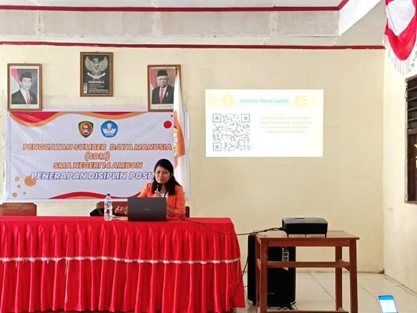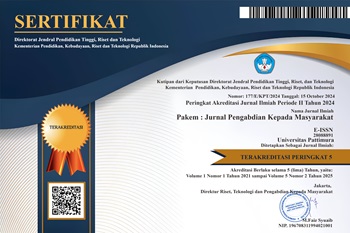DISIPLIN POSITIF: PENGUATAN SUMBER DAYA MANUSIA SMA NEGERI 14 AMBON
Abstract
Challenges in maintaining discipline often affect the quality of interaction between teachers and students. Therefore, the positive discipline approach emerged as a strategy that focused on reinforcing good behavior and creating an inclusive learning environment. This community service activity aims to provide positive discipline training SMA Negeri 14 Ambon teachers an effort to strengthen teacher' soft skills, namely discipline, communication, leadership, patience, critical thinking and problem solving. This activity was conduct in four stages; preparation, implementation, evaluation, and reflection. The evaluation instrument used was a test, to measure the extent of teachers' understanding of the training materials delivered. The results of the pre-test and post-test analysis showed an average N-gain of 0.91 and was in the high category. This shows an increase in the basic abilities of the participants related to the application of positive discipline. Through this activity, participants gained insight into the importance of positive discipline in creating an inclusive learning environment, so that with the skills they have, participants can become pioneers in implementing positive discipline
Downloads
References
Annisa, F. (2019). Penanaman Nilai-Nilai Pendidikan Karakter Disiplin Pada Siswa Sekolah Dasar. Perspektif Pendidikan Dan Keguruan, 10(1), 69–74. https://doi.org/10.25299/perspektif.2019.vol10(1).3102
Asbari, M., Novitasari, D., Wardoyo, S., & Lafendry, F. (2024). Membangun Lingkungan Belajar Positif: Seminar Implementasi Disiplin Positif di Sekolah Menengah Atas. Niswantara: Jurnal Pengabdian Kepada Masyarakat, 01(01), 8–14. https://ejournal.ayasophia.org/index.php/niswantara/article/view/9
Clarken, R. H. (2009). Moral Intelligence in the Schools. Annual Meeting of the Michigan Academy of Sciences, Arts and Letters, 1–9.
Hake, R. R. (1998). Interactive-engagement versus traditional methods: A six-thousand-student survey of mechanics test data for introductory physics courses. American Journal of Physics, 66(1), 64–74. https://doi.org/10.1119/1.18809
Hortensi, G. (2020). Penerapan Bimbingan Kelompok Dengan Teknik Konseling Individual Untuk Meningkatkan Disiplin Belajar Siswa Smk Negeri 5 Mataram. Indonesian Journal of Educational Development, 1(2), 159–169. https://doi.org/10.5281/zenodo.4003791
Meltzer, D. E. (2002). The relationship between mathematics preparation and conceptual learning gains in physics: A possible “hidden variable” in diagnostic pretest scores. American Journal of Physics, 70(12), 1259–1268. https://doi.org/10.1119/1.1514215
Noya, A. (2021). Analisis Penerapan Pola Asuh Orangtua di Gereja Protestan Maluku (GPM) Klasis Masohi, Kabupaten Maluku Tengah. Annual Conference on Islamic Early Childhood Education (ACIECE), 5, 73–80. http://conference.uin-suka.ac.id/index.php/aciece/article/view/634/280
Prasetyo, A. S. (2023). Internalisasi Nilai Di Zi Gui – Pendidikan Karakter Melalui Disiplin Positif Dalam Proses Pembelajaran. Jurnal Keguruan Dan Ilmu Pendidikan (JKIP), 1(3), 118–130. https://doi.org/10.61116/jkip.v1i3.148
Putikadyanto, A. P. A., Amin, M. B., & Wachidah, L. R. (2024). Mewujudkan Sekolah Ramah Anak: Implementasi Disiplin Positif dalam Kurikulum Merdeka. Kiddo: Jurnal Pendidikan Islam Anak Usia Dini, 106–116. https://doi.org/10.19105/kiddo.v1i1.12766
Saputra, A. S. (2023). Menumbuhkan Disiplin Diri Melalui Disiplin Positif Restitusi. Didaktik : Jurnal Ilmiah PGSD STKIP Subang, 9(2), 5666–5682. https://doi.org/10.36989/didaktik.v9i2.1367
Souisa, J. H., Purwaningratri, M. A., Subagyo, Utami, S., & Al-Huda, B. (2022). Disiplin Positif untuk Merdeka Belajar Strategi Penerapan pada Jenjang SMA.
Sukamti, L., & Widiastuti, A. A. (2022). Implementasi Disiplin Positif Oleh Orangtua Dalam Proses Pengasuhan Terhadap Anak. PAUDIA : Jurnal Penelitian Dalam Bidang Pendidikan Anak Usia Dini, 11(2), 532–537. https://doi.org/10.26877/paudia.v11i2.12311
Yuannita, P., Gunarti, C. S. I., & Tiasari, A. J. (2020). Paradigma dan Visi Guru Penggerak. In Modul Guru Penggerak (Vol. 1). Kementerian Pendidikan dan Kebudayaan.
Yulianto, H. (2024). Disiplin Positif Pada Kurikulum Merdeka: Tinjauan Filosofi Pendidikan Menurut Ki Hajar Dewantara. JICN: Jurnal Intelek Dan Cendikiawan Nusantara, 1(1), 626–637. https://jicnusantara.com/index.php/jicn/article/view/89

Copyright (c) 2025 PAKEM : Jurnal Pengabdian Kepada Masyarakat

This work is licensed under a Creative Commons Attribution-NonCommercial-ShareAlike 4.0 International License.
Authors who publish with PAKEM: Jurnal Pengabdian Kepada Masyarakat agree to the following terms:
- Authors grant copyright to the journal and right of first publication with the work simultaneously licensed under a Creative Commons Attribution License (CC BY-NC-SA 4.0)
- Authors are able to enter into separate, additional contractual arrangements for the non-exclusive distribution of the journal's published version of the work (e.g., post it to an institutional repository or publish it in a book), with an acknowledgment of its initial publication in this journal.
- Authors are permitted and encouraged to post their work online (e.g., in institutional repositories or on their website) prior to and during the submission process, as it can lead to productive exchanges, as well as earlier and greater citation of published work.

.jpg)













